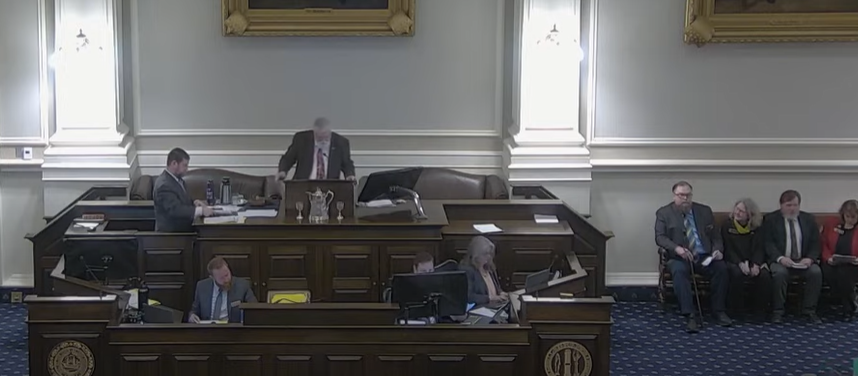By PAULA TRACY, InDepthNH.org
CONCORD – A minimum wage bill which would have increased pay up to $17 an hour by 2029, did not pass the House of Representatives Thursday nor did a so-called “right-to-work” bill.
The vote on House Bill 1322 relative to minimum wage was 187-192.
A move to table the bill failed and a move to indefinite postponement passed 193-187.
A “right-to-work” bill was also moved to indefinite postponement on a vote of 212-168 in keeping with previous votes over the years.
And an education adequacy bill is headed to House Finance.
House Bill 1377 would have allowed workers not to pay into a union which they were not a member of, but still benefit from their organization.
More than 1,400 members of the public testified or signed on to a position on the bill over two days of testimony, and about 50 were in support of right-to-work.
Rep. Michael Granger, R-Rochester, supported the measure.
“I am an independent worker,” he said. He said people who don’t join unions are resented and called a “free rider” from unions.
“Evil is self-defeating,” Granger said in supporting the bill.
But Rep. Dan Leclerc, D-Amherst, said the measure is about destroying unions and its “right-to-work” label is a misnomer.
He said he has been in the carpenters union for 28 years and said his father was a member of the Teamsters union. He said his dad missed his graduation because he had to work but he came to understand the commitment he made to work.
When his father became sick he received benefits and his mother was able to stay in her home until her death because of the benefits.
Passing this bill, Leclerc said, would reduce New Hampshire’s standards of living for its workers.
Rep. Brian Sullivan, D-Grantham, said the House has been killing right-to-work bills for 40 years and knows right-to-work is wrong for the state.
Others who supported the measure said many workers don’t want a union job and this would provide a right to them to work without being coerced.
MINIMUM WAGE
New Hampshire’s minimum wage is tied to the national rate of $7.25
Opponents of House Bill 1322 said there really are few workers making minimum wage and in most cases, starting wages are at $13 to $15 now, with many looking to hire.
Prime Sponsor of HB 1322, Rep. Kathy Staub, D-Manchester, released the following statement:
“A fair economy in New Hampshire is what Granite Staters deserve. HB 1322 rewards hard work and is an investment in the middle class. This bill would have gradually increased the state’s minimum wage to $17 by 2029, matching the current living wage for New Hampshire. Such a raise is essential, as over 126,000 workers in the state earn less than $17 per hour, and a third of our residents struggle to make ends meet.”
EDUCATION ADEQUACY FORMULA HEADS TO FINANCE
A $130 million bill as amended in HB 1583 which looks at the cost of an adequate education is headed to the House Finance Committee after a vote of 178-150.
The bill is relative to a per-pupil education amount and increases the base cost to communities while also establishing relief aid.
State Rep. Michael Belcher, R-Wakefield, said funding for education keeps going up yet the test scores and achievement keeps coming down.
“Funding is not the solution,” he said. It is the problem because of how the funds are spent, largely on administration, therapy sessions and the path forward to a genuinely adequate education requires reversing course and returning to academics, he said.
“When we fund them in excess, they will use it on programs that are objectively harmful,” he said.
The bill addresses a singular “base cost” now at $4,182.
It also helps communities with higher poverty levels.
Also passed and on its way to Finance is HB 1656 relative to special education funding.
MUSIC THERAPISTS
The House decided to pass a bill which would license music therapists under the state. Opponents said it was wanted by those who provide the service and want to bill the Veterans Administration and Medicare for the service. The ought to pass vote on House Bill 1394 was 194-186. It now heads to the Finance committee.
PUPPY MILL BILL
A measure which would have required all stores to prohibit the sale of cats and dogs was killed. HB 1680 went down on a 260-117 vote.
SOLID WASTE PROVISION KILLED
House Bill 1630 which would have established an extended producer responsibility program for companies that create packaging which is adding to a waste crisis, and would cost the state up to $1.6 million in administration, was killed on a vote of 199-176.
Some House members suggested an interim study committee instead, noting that the state is currently behind on its solid waste management goals to reduce waste by 45 percent by 2050. This could be helpful to reducing waste, some argued.
Some said it would be downshifting costs to consumers and might be better as a federal program.
STATE ORGANIC PROGRAM
House Bill 1184 which would have eliminated the state’s organic certification program known as DAMP failed by two votes, 185-187.
Rep. Barbara Comtois, R-Center Barnstead, said New Hampshire’s program is not sustainable in cost and involves only 58 farms of the more than 4,000 in the state and there are other out-of-state certification programs.
Rep. Dan Wolf, R-Newbury said since 1987 the department has served this population but has not increased the fees.
Other supporters said the program provides an important connection between farmer and the Department of Agriculture and it benefits the soil and health of the state.





